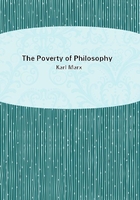
第22章 (4)
Thus money, which for Ricardo is no longer a value determined by labor time, and which J. B. Say therefore takes as an example to convince Ricardo that the other values could not be determined by labor time either, this money, I say, taken by J. B. Say as an example of a value determined exclusively by supply and demand, becomes for M. Proudhon the example par excellence of the application of value constituted... by labor time.
To conclude, if money is not a value "constituted" by labor time, it is all the less likely that it could have anything in common with M.
Proudhon's true "proportion". Gold and silver are always exchangeable, because they have the special function of serving as the universal agent of exchange, and in no wise because they exist in a quantity proportional to the sum total of wealth; or, to put it still better, they are always proportional because, alone of all commodities, they serve as money, the universal agent of exchange, whatever their quantity in relation to the sum total of wealth.
"A circulation can never be so abundant as to overflow; for by diminishing its value, in the same proportion you will increase its quantity, and by increasing its value, diminish its quantity."(Ricardo [II 205])
"What an imbroglio this political economy is!" cries M. Proudhon. [I 72]
"Cursed gold!" cries a Communist flippantly (through the mouth of M. Proudhon). You might as well say: Cursed wheat, cursed vines, cursed sheep! -- for "just like gold and silver, every commercial value must attain its strictly exact determination." [I 73]
The idea of making sheep and vines attain the status of money is not new. In France, it belongs to the age of Louis XIV. At that period, money having begun to establish its omnipotence, the depreciation of all other commodities was being complained of, and the time when "every commercial value" might attain its strictly exact determination, the status of money, was being eagerly invoked. Even in the writings of Boisguillebert, one of the oldest of French economists, we find:
"Money, then, by the arrival of innumerable competitors in the form of commodities themselves, re-established in their true values, will be thrust back again within its natural limits."(Economistes financiers du dix-huitieme siecle, Daire edition, p.422)One sees that the first illusions of the bourgeoisie are also their last.
B) Surplus Labor "In works on political economy we read this absurd hypo- thesis: If the price of everything were doubled.... As if the price of everything were not the proportion of things -- and one could double a proportion, a relation, a law!"(Proudhon, Vol.I, p.81)
Economists have fallen into this error through not knowing how to apply the "law of proportionality" and of "constituted value".
Unfortunately in the very same work by M. Proudhon, Volume I, p.110, we read the absurd hypothesis that, "if wages rose generally, the price of every thing else would rise". Furthermore, if we find the phrase in question in works on political economy, we also find as explanation of it.
"When one speaks of the price of all commodities going up or down, one always excludes some one commodity going up or down. The excluded commodity is, in general, money or labor."( Encyclopedia Metropolitana or Universal Dictionary of Knowledge , Vol.IV, Article "Political Economy", by [N. W.]
Senior, London 1836. Regarding the phrase under discussion, see also J. St. Mill: Essays on Some Unsettled Questions of Political Economy , London 1844, and Tooke: A History of Prices, etc. , London 1838. [Full reference is Th. Tooke, A History of Prices, and of the State of the Circulation, from 1793 to 1837 , Vols.I-II, London, 1838])Let us pass now to the second application of "constituted value", and of other proportions -- whose only defect is their lack of proportion. And let us see whether M. Proudhon is happier here than in the monetarization of sheep.
"An axiom generally admitted by economists is that all labor must leave a surplus. In my opinion this proposition is universally and absolutely true: it is the corollary of the law of proportion, which may be regarded as the summary of the whole of economic science. But, if the economists will permit me to say so, the principle that all labor must leave a surplus is meaningless according to their theory, and is not susceptible of any demonstration."(Proudhon [I 73])
To prove that all labor must leave a surplus, M. Proudhon personifies society;he turns it into a person, Society -- a society which is not by any means a society of persons, since it has its law apart, which have nothing in common with the persons of which society is composed, and its "own intelligence", which is not the intelligence of common men, but an intelligence devoid of common sense. M. Proudhon reproaches the economists with not having understood the personality of this collective being. We have pleasure in confronting him with the following passage from an American economist, who accuses the economists of just the opposite:
"The moral entity -- the grammatical being called a nation, has been clothed in attributes that have no real existence except in the imagination of those who metamorphose a word into a thing.... This has given rise to many difficulties and to some deplorable misunderstanding in political economy."(Th. Cooper, Lectures on the Elements of Political Economy , Columbia 1826)[The first edition of the book was published in Colombia in 1826. A second, enlarged edition appeared in London in 1831.]
"This principle of surplus labor," continues M. Proudhon, "is true of individuals only because it emanates from society, which thus confers on them the benefit of its own laws."[I 75]